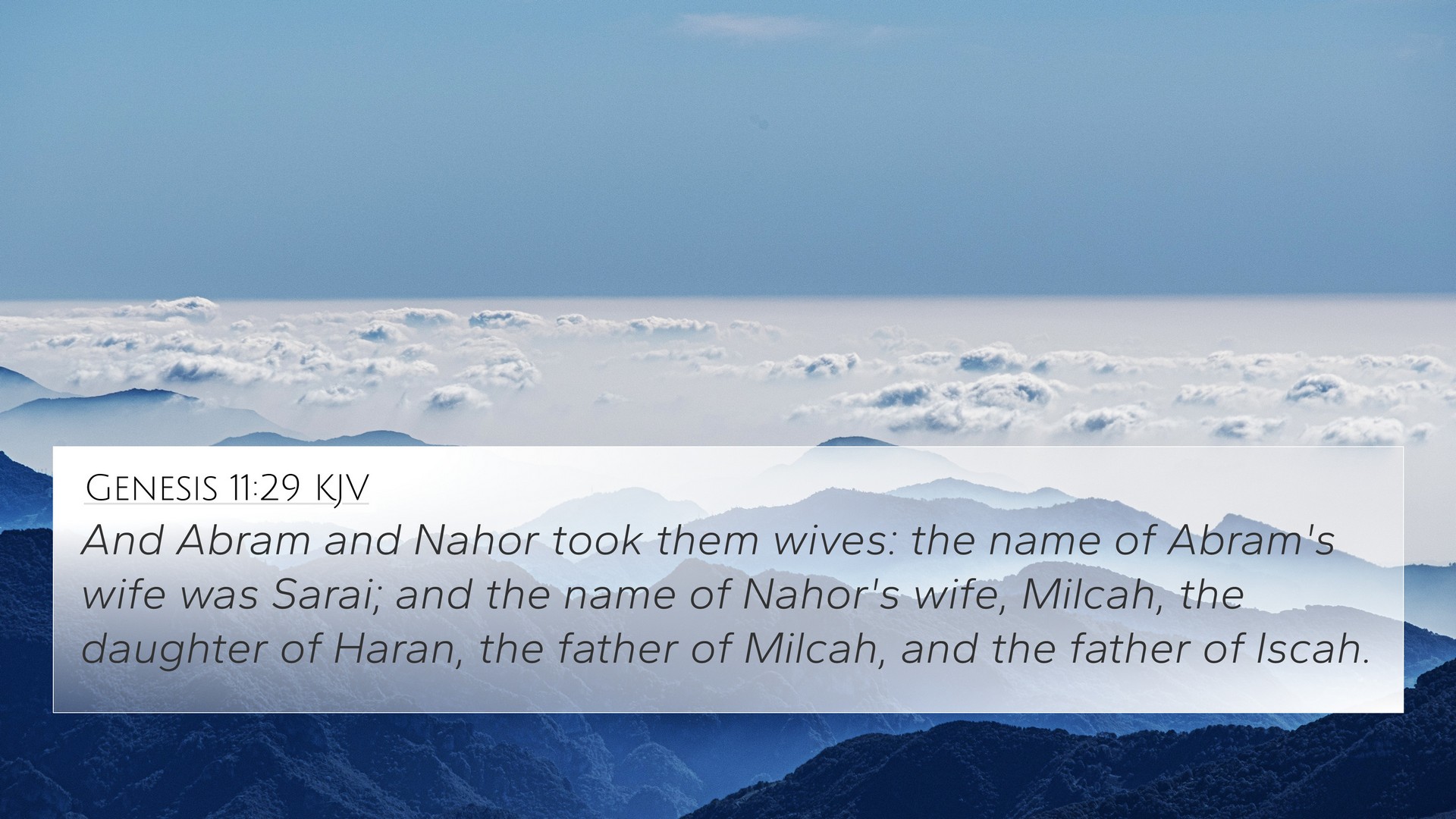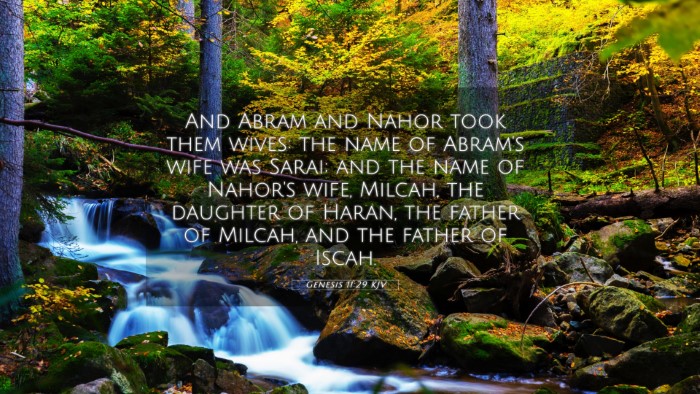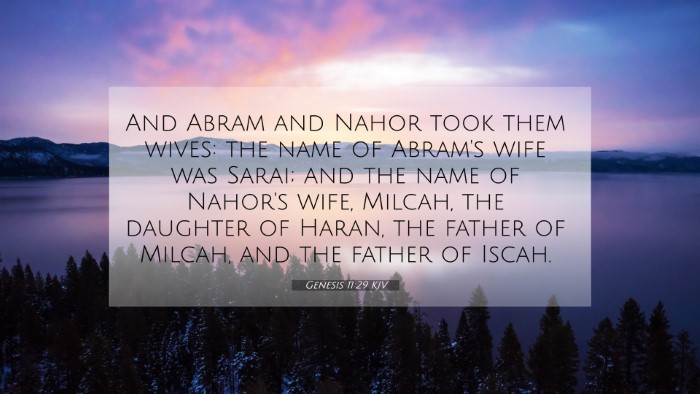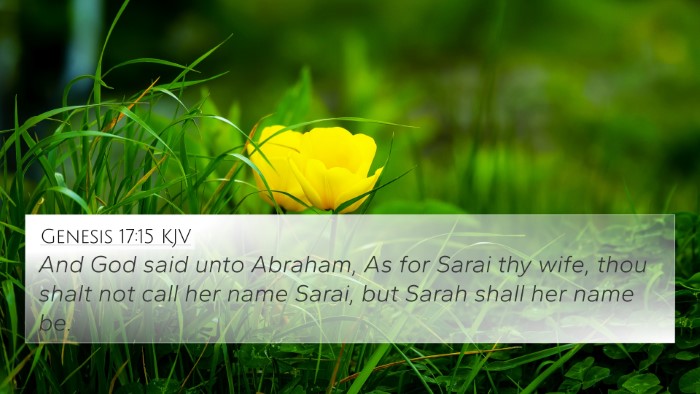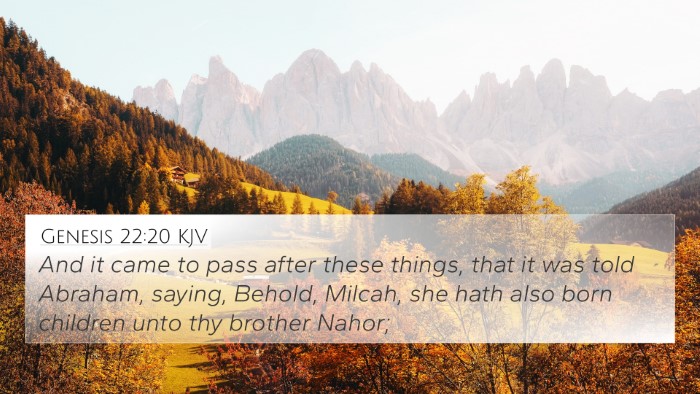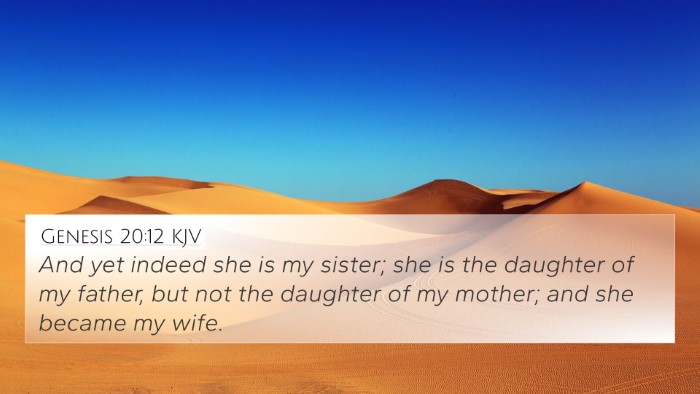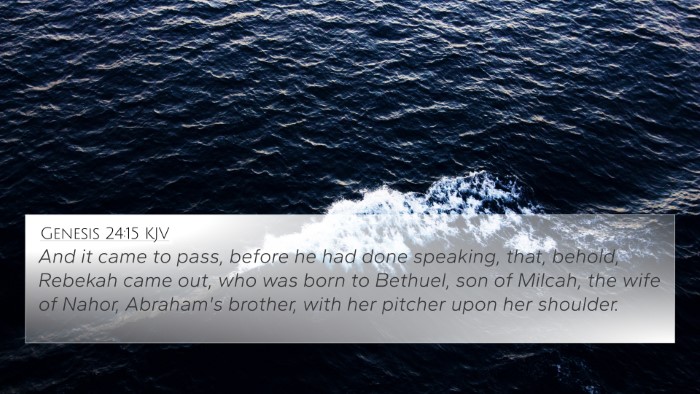Understanding Genesis 11:29
Genesis 11:29 states: “And Abram and Nahor took them wives: the name of Abram's wife was Sarai, and the name of Nahor's wife, Milcah, the daughter of Haran, the father of Milcah, and the father of Iscah.” This verse introduces us to key characters in the Abrahamic narrative and sets the stage for the development of the Israelite lineage.
Verse Meaning and Interpretations
In this verse, we see the beginnings of the lineage of Abram (later Abraham), who is central to the biblical narrative. The mention of Sarai (later Sarah) and Nahor's wife Milcah provides insight into the family dynamics and genealogical setup of the time.
- Family Connections: The verse highlights familial relationships that are crucial in the biblical context, illustrating how social structures were established.
- Theological Significance: The union of Abram and Sarai becomes significant in the covenantal promise of descendants, showcasing God's plan for Israel.
- Preservation of Lineage: The mention of Nahor and Milcah indicates the importance of preserving lineage, a theme prevalent throughout the scriptures.
Commentary Insights
Various public domain commentaries provide rich insights into Genesis 11:29:
Matthew Henry
Henry emphasizes the importance of marriage in God's creation, noting that Abram and Nahor's choice of wives reflects the cultural context of their time while foreshadowing the significance of Sarai in God's covenant. He also highlights that this marks a shift towards a more divine lineage with Abram.
Albert Barnes
Barnes focuses on the genealogical aspects of this verse, illustrating how these connections are essential for understanding the narrative flow leading to the Israelite nation. He suggests that the mention of Milcah is particularly important within the context of the subsequent theological narrative.
Adam Clarke
Clarke provides additional depth by noting that the family's development is pivotal for the unfolding of God's promises. He points out that Milcah’s father, Haran, is mentioned, which allows readers to trace the connection between diverse biblical characters.
Bible Verse Cross-References
Genesis 11:29 connects with various other biblical verses, enhancing our understanding through a comparative Bible verse analysis. Here are notable cross-references:
- Genesis 12:1-3: God's call to Abram signifies the beginning of a covenantal relationship, which is foundational for the Israelites.
- Genesis 17:15-16: The importance of Sarai’s role as the mother of nations illustrates the fulfillment of God's promises.
- Genesis 22:1-2: Further development of Abraham's lineage leading to Isaac, demonstrating God's faithfulness.
- Exodus 3:6: God identifies Himself as the God of Abraham, emphasizing the significance of Abram's covenant.
- Matthew 1:1-2: The genealogy of Jesus Christ begins with Abraham, linking the New Testament back to this verse.
- Hebrews 11:8-12: Reflects on Abram's faith and the promise of descendants, giving us a New Testament perspective on Genesis 11:29.
- Galatians 3:29: Indicates that those who belong to Christ are considered Abraham's descendants, demonstrating the lasting impact of this lineage.
Connections between Bible Verses
Thematic Bible verse connections are essential for a holistic understanding of scripture. Genesis 11:29 is part of a larger narrative that stretches across both Testaments. Some connections to explore include:
- Identifying connections between the Old and New Testament: The covenant with Abraham has implications in the fulfillment of New Testament prophecies.
- Cross-referencing Psalms with New Testament teachings: The Psalms frequently highlight the significance of descendants and God’s faithfulness.
- Links between the Prophets and Apostolic teachings: Many prophets refer back to Abraham's promise in their declarations of hope and restoration.
Tools for Bible Cross-Referencing
For those interested in cross-referencing Bible study, several tools can enhance your study experience:
- Bible concordance: A useful resource for locating specific words and their occurrences throughout scripture.
- Bible cross-reference guide: Identifies connections between verses, facilitating deeper study.
- Cross-reference Bible study methods: Techniques such as thematic studies can uncover broader connections.
- Bible reference resources: Numerous online tools and print resources are available for in-depth scripture analysis.
Conclusion
Understanding Genesis 11:29 involves recognizing the significance of family relationships and covenantal promises in the broader biblical narrative. By analyzing connections between Bible verses and utilizing cross-referencing tools, one can gain a deeper appreciation for the intricacies of scripture. Each verse informs the next, illuminating the path of God’s redemptive work through history.
